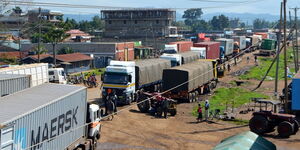The government has stepped in to avert a looming crisis among wheat farmers following complaints of stranded produce due to several factors.
On Monday, March 3, the Ministry of Agriculture announced that the National Cereals and Produce Board (NCPB) was set to commence the collection of 321,000 bags of wheat from farmers across the country.
In a statement, the Mutahi Kagwe-led ministry directed farmers to deliver their wheat to NCPB warehouses nationwide, effective March 4, 2025.
The government also committed to making payments within 30 days of delivery in a bid to avoid a backlog and support farmers.
Additionally, a Memorandum of Understanding (MoU) between the NCPB and millers has been put in place, ensuring that millers collect wheat from the NCPB and that farmers are paid within 14 to 21 days.
The move will be welcomed by farmers, particularly those from Narok, who recently lamented being stuck with tonnes of wheat following a bumper harvest this year.
In February, it was estimated that at least 10 million 90-kilogramme bags remained in storage since the harvesting season began in August 2024.
According to the farmers, this was largely because millers showed little to no interest in purchasing the wheat yields.
It has since emerged that millers favoured cheaper imported wheat over the locally produced grain - a practice which undermined local farmers who struggle to improve the quality of their produce while standardising market prices at the same time.
To address this challenge, CS Kagwe on Monday issued a warning to unscrupulous millers against attempting to manipulate the system by introducing imported wheat into the NCPB's supply chain, stating that such actions would lead to serious penalties.
Kagwe aims to reduce the importation of wheat by encouraging local farmers to scale up their production to meet 40 per cent of the demand from millers, up from the current percentage.
The move to have NCPB collect wheat directly from farmers is also part of the government's strategy to establish a database that can be used to distribute subsidised fertiliser to farmers, thereby improving the quality of their produce.












